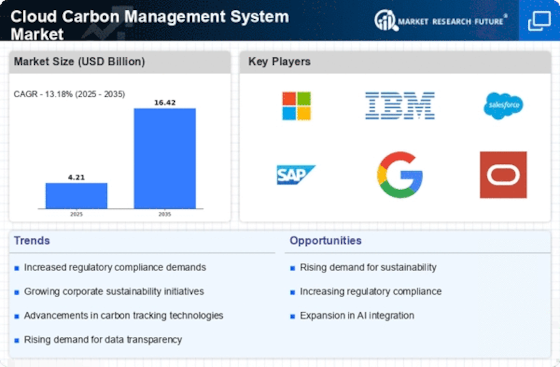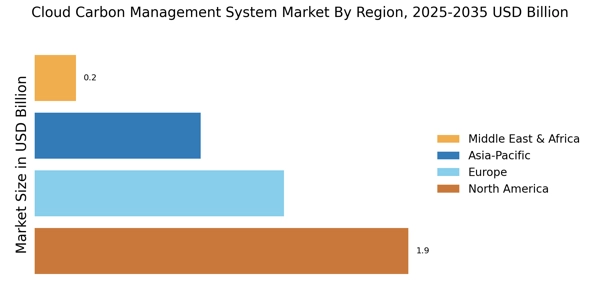Government Incentives and Support
Government incentives and support are emerging as critical drivers for the Cloud Carbon Management System Market. Many governments are implementing policies and programs aimed at promoting sustainability and reducing carbon emissions. These initiatives often include financial incentives, tax breaks, and grants for organizations that adopt carbon management solutions. As regulatory frameworks become more stringent, businesses are increasingly motivated to invest in cloud-based carbon management systems to comply with government mandates. This trend is likely to accelerate the adoption of such systems, as organizations seek to leverage available support to enhance their sustainability efforts. The Cloud Carbon Management System Market stands to benefit from these favorable government policies, which are designed to encourage the transition towards a low-carbon economy.
Corporate Social Responsibility Initiatives
The Cloud Carbon Management System Market is significantly influenced by the rising emphasis on corporate social responsibility (CSR) initiatives. Companies are increasingly recognizing the importance of demonstrating their commitment to sustainability and environmental stewardship. As stakeholders, including consumers and investors, demand greater transparency regarding corporate practices, organizations are compelled to adopt carbon management solutions that align with their CSR objectives. This shift is evident in various sectors, where businesses are integrating carbon management systems into their sustainability frameworks. The market is projected to witness substantial growth as companies seek to enhance their CSR profiles through effective carbon management. By leveraging cloud-based solutions, organizations can streamline their reporting processes and showcase their efforts in reducing carbon emissions, thereby enhancing their reputation and competitiveness in the market.
Rising Demand for Carbon Footprint Reduction
The Cloud Carbon Management System Market is experiencing a notable surge in demand as organizations increasingly prioritize carbon footprint reduction. This trend is driven by heightened awareness of climate change and the need for sustainable practices. Companies are actively seeking solutions that enable them to monitor, report, and reduce their carbon emissions effectively. According to recent estimates, the market for carbon management solutions is projected to grow at a compound annual growth rate of over 20% in the coming years. This growth reflects a broader shift towards environmental responsibility, compelling businesses to adopt cloud-based systems that facilitate real-time tracking and management of carbon emissions. As a result, the Cloud Carbon Management System Market is poised for significant expansion, driven by the urgent need for effective carbon management strategies.
Technological Advancements in Data Analytics
Technological advancements in data analytics are playing a pivotal role in shaping the Cloud Carbon Management System Market. The integration of sophisticated analytics tools allows organizations to gain deeper insights into their carbon emissions and identify areas for improvement. These tools enable businesses to analyze vast amounts of data, facilitating informed decision-making regarding carbon reduction strategies. The increasing availability of cloud-based platforms enhances accessibility and scalability, making it easier for companies to implement carbon management solutions. As organizations strive to optimize their operations and reduce their environmental impact, the demand for advanced data analytics within the Cloud Carbon Management System Market is expected to rise. This trend suggests a growing recognition of the importance of data-driven approaches in achieving sustainability goals.
Growing Investor Pressure for Sustainable Practices
Investor pressure for sustainable practices is becoming a significant driver in the Cloud Carbon Management System Market. As environmental, social, and governance (ESG) criteria gain prominence, investors are increasingly scrutinizing companies' sustainability efforts. This scrutiny often translates into demands for transparency in carbon emissions reporting and the implementation of effective carbon management strategies. Organizations that fail to address these concerns may face reputational risks and potential financial repercussions. Consequently, many companies are turning to cloud-based carbon management systems to meet investor expectations and demonstrate their commitment to sustainability. The market is likely to see continued growth as businesses recognize the importance of aligning their operations with investor demands for responsible environmental practices.

















